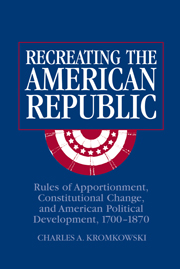 Recreating the American Republic
Recreating the American Republic Book contents
Preface: The Paradox of Constitutional Consent
Published online by Cambridge University Press: 14 July 2009
Summary
But of all the means we have mentioned for ensuring the stability of constitutions — but one which is nowadays generally neglected — is the education of citizens in the spirit of their constitution.
Amidst the welter of discrete approaches and dispositions that happily constitute the social sciences, studies of past and present politics remain unified by a common interest in the conditions, causes, and consequences of collective authority. Across the disciplines of political science and history, many of these studies provide descriptions or measurements of various forms of collective authority. Other studies provide explanations of the causes or consequences of this authority; still others provide theories that account for its creation, transformation, or breakdown. This study speaks directly to these two disciplines and their common interest by describing, by explaining, and by proposing and testing a theory accounting for the development of the American political order between 1700 and 1870.
To engage these parallel but divided audiences in these purposes, this study's format not only enables a comparative historical analysis of the events and eras surrounding the American Revolution, the 1787 Constitutional Convention, and the American Civil War, it also facilitates the recognition and synthesis of the distinct scholarly contributions made by the disciplines of history and political science.
- Type
- Chapter
- Information
- Recreating the American RepublicRules of Apportionment, Constitutional Change, and American Political Development, 1700–1870, pp. xiii - xxxiiPublisher: Cambridge University PressPrint publication year: 2002


